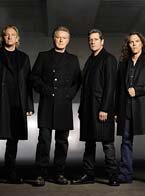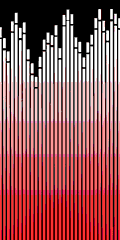Eagles take the fast lane to JPJ
 Will Van Halen eventually play John Paul Jones Arena? We’ll find out in “The Long Run.” Until then, classic rock fans have ’70s giants the Eagles to look forward to when they come to the JPJ on Wednesday, May 21.
Will Van Halen eventually play John Paul Jones Arena? We’ll find out in “The Long Run.” Until then, classic rock fans have ’70s giants the Eagles to look forward to when they come to the JPJ on Wednesday, May 21.
Tickets for the show go on sale next Friday, April 4 at 10am and will be available at the box office, online, or by calling 1-888-JPJ-TIXS. No word yet on what seats will cost, but considering that tickets to one of their four shows already on sale range from $65-$185, don’t expect ticket prices to “Take It Easy” on fans’ wallets.
If you’re under the age of 30 or over the age of 70, the Eagles are one of the best-selling bands in the world, scoring five #1 singles, six #1 albums, and selling more than 100 million albums worldwide, including 29 million copies of Their Greatest Hits 1971-1975, which officially passed Michael Jackson’s Thriller in 2000 as the biggest-selling album in American recording history (not to mention another 14 million copies of the compilation sold abroad).
After they met from playing with Linda Ronstadt on her album Silk Purse, Don Henley and Glen Frey formed the Eagles in 1971 and soon released their self-titled debut the following year, spawning three Top 40 hits: “Take It Easy,” “Witchy Woman,” and “Peaceful Easy Feeling.”
Their follow-up Desperado was a commercial failure at the time, despite its title track’s future iconic status, and three years later the band re-tooled by enlisting guitarist Don Felder, and former James Gang guitarist Joe Walsh into its lineup. The result was Hotel California, which contained such hits as “Life in the Fast Lane,” “New Kid in Town,” and the title track, has sold 26 million copies to date worldwide
Soon, former Poco bassist Timothy B. Schmit would join the mix and cemented Henley, Frey, Schmit, Walsh, and Felder as the classic Eagles lineup, which disbanded acrimoniously in 1980, only to reunite for the cheekily dubbed reunion concert album Hell Freezes Over in 1994. After several successful tours through the ’90s, the band had an unexpected falling out with Felder in 2001, firing him from the group. Felder and his former bandmates proceeded to exchange lawsuits, which were settled in 2007 after they awarded Felder an undisclosed sum.
Last year, the Felder-less Eagles released Long Road Out of Eden, their first album of new material since 1980. The track “How Long” just earned the band a Grammy for Best Country Performance by a Duo or Group with Vocals, the fifth golden phonograph the Eagles have earned in their nearly 40 years.
#










I believe the ticketing # is 888-JPJ-TIXS not TIXX
Enrique, I stand corrected. The number is 1-888-JPJ-TIXS or if you don’t like hunting for the tiny letters on your keypad, 1-888-575-8497.
Fastlane to sucktown. Geez.
Can we please not have the customary hand-wringing when this show fails to come close to selling out? Thanks in advance.
For the record, and those under 30 or over 70 as you stated, your history of the Eagles is nowhere near correct. It’s true that the “Desperado” album was something of a flop at the time. But that had nothing to do with the band’s lineup changes. I could go into more detail about the reasons, but quickly, Don Felder joined the band in 1974 near the end of recording sessions for the follow-up to “Desperado”, entitled “On the Border”. That lineup (including original members Randy Meisner and Bernie Leadon) remained together through 1975’s “One of These Nights” and the subsequent tours. After that, Bernie Leadon quit the band and Joe Walsh joined at some point prior to the recording of the “Hotel California” album. In late 1977, Randy Meisner quit the band and Timothy B. Schmit joined. Schmit joined in time for the extended touring for “Hotel California” and remained with the band through the recording of “The Long Run” and “Eagles Live”. The band broke up in 1980 and reunited in 1994, with their “Long Run”-era lineup, for the “Hell Freezes Over” TV special, album and tour. Felder was fired from the band in 2001 and they have been touring and recording as a quartet since then. For those who are interested in more (accurate) details about the band, I suggest the excellent fan site http://www.eaglesfans.com (FYI, not my site).
Dear Amy,
Thanks so much for weighing in. Indeed, Meisner and Leadon’s contributions are not to be minimized. So many of the songs on Their Greatest Hits 1971-1975 bear their mark including “Take It to the Limit” “Witchy Woman,” and “One of These Nights.” However, I figured with the current lineup being what it is, I thought it best to focus on the band members that Charlottesville are about to see.
Sincerely,
Lindsay Barnes
Lindsay, my point was that your history states that as a direct result of the failure of “Desperado”, Schmit, Felder and Walsh were brought in, and that “Hotel California” followed those changes. That is simply not correct. Even ignoring the causes of the lineup changes, your chronology of the arrival of the new members is just wrong. For instance, one error is that Schmit did not join until one year after “Hotel California” was released.
It’s been a long night and I hate the f**ing Eagles, man.